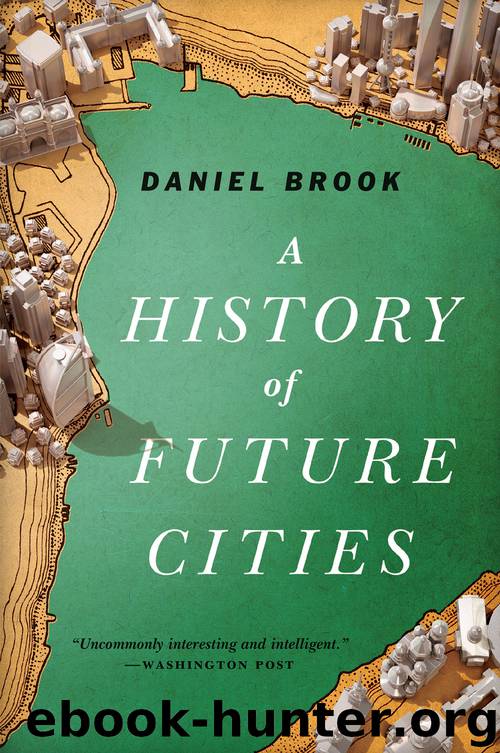A History of Future Cities by Daniel Brook

Author:Daniel Brook
Language: eng
Format: epub
Publisher: W. W. Norton & Company
II: THE DARK AGES | Shanghai, 1937–1989
In the summer of 1937, the militarist empire of Japan, intent on subduing a vast swath of Asia, attacked China. That fall, vicious urban warfare swept Shanghai as the Japanese invaded the Chinese districts of the city. The fighting left some one hundred thousand Chinese dead, many felled in hand-to-hand combat.
For the Western residents of the foreign settlements, it was just more of the same. The key to the Shanghai concessions’ success had always been as an island of stability in the midst of chaos. With their nations still at peace with Japan, the Britons, French, and Americans felt themselves to be safely in the eye of the storm. After a night on the town, Shanghailanders in tuxedos and evening gowns would go up to the rooftops of the city’s industrial warehouses and watch the fighting less than half a mile away as if it were a fireworks display.
As usual, the instability sent an influx of Chinese refugees to the foreign concessions, boosting their populations and economies. The city similarly benefited from the storm clouds gathering over Europe. In the late 1930s, twenty-five thousand stateless German and Austrian Jews who had been stripped of their citizenship by the Nazi regime poured into Shanghai, the only city in the world where neither passport nor visa were required for entry. While initially a burden on the city—Sir Victor Sassoon turned vacant offices and apartments in his Embankment Building on the Suzhou Creek into a massive social service agency to aid his desperate coreligionists—the influx of so many Western-educated professionals and entrepreneurs soon proved a boon to the local economy. Ironically, the Jewish refugees who had been told by their government that they were not, and never could be, Germans brought their Germanic culture with them, strengthening the Central European layer of international Shanghai’s multicultural stew. Viennese coffeehouses soon sprang up along the avenues of the concessions, and the cabarets that the Nazis had closed down as too “decadent” and “degenerate” for fascist Berlin found a home in a city where “decadent” and “degenerate” were considered high praise for a nightlife act. To oversee entertainment at the Cathay Hotel’s Tower Club, Sir Victor hired Fredy Kaufman, a veteran cabaret impresario who had been run out of Hitler’s Berlin.
In time, however, the escalating turmoil that became World War II would overwhelm even international Shanghai. As Japanese warplanes launched their surprise attack on Pearl Harbor in 1941, Japanese naval vessels sailed up the Huangpu to attack the Anglo-American International Settlement. The battle was brief. A single British gunboat, no match for the Japanese armada, protected the river. As royal navy sailors jumped overboard and swam for the shore, pajama-clad British guests from the Bund’s luxury hotels waded into the mud to aid them. The Japanese took the International Settlement that very day. The French Concession, administered by the Nazi’s Vichy France puppet regime since the fall of Paris in 1940, endured until 1943 when the Germans gave it to their Japanese allies outright.
Download
This site does not store any files on its server. We only index and link to content provided by other sites. Please contact the content providers to delete copyright contents if any and email us, we'll remove relevant links or contents immediately.
Nudge - Improving Decisions about Health, Wealth, and Happiness by Thaler Sunstein(7706)
The Fire Next Time by James Baldwin(5442)
iGen by Jean M. Twenge(5415)
Adulting by Kelly Williams Brown(4574)
The Sports Rules Book by Human Kinetics(4386)
The Hacking of the American Mind by Robert H. Lustig(4381)
The Ethical Slut by Janet W. Hardy(4251)
Captivate by Vanessa Van Edwards(3839)
Mummy Knew by Lisa James(3691)
In a Sunburned Country by Bill Bryson(3542)
The Worm at the Core by Sheldon Solomon(3487)
Ants Among Elephants by Sujatha Gidla(3467)
The 48 laws of power by Robert Greene & Joost Elffers(3291)
Suicide: A Study in Sociology by Emile Durkheim(3022)
The Slow Fix: Solve Problems, Work Smarter, and Live Better In a World Addicted to Speed by Carl Honore(3009)
The Tipping Point by Malcolm Gladwell(2921)
Humans of New York by Brandon Stanton(2873)
Get What's Yours for Medicare: Maximize Your Coverage, Minimize Your Costs by Philip Moeller(2728)
Handbook of Forensic Sociology and Psychology by Stephen J. Morewitz & Mark L. Goldstein(2704)
